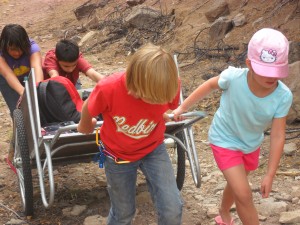 Expeditionary Learning emphasizes five Core Practices within its schools:
Expeditionary Learning emphasizes five Core Practices within its schools:
• Learning Expeditions: These challenging, interdisciplinary, real-world projects and in-depth studies act as the primary curriculum units in Expeditionary Learning schools. Learning Expeditions support critical literacy and address central academic standards of content, while promoting character development and fostering a service ethic.
• Active Pedagogy: In Expeditionary Learning schools, teachers use active pedagogy to help students become active and collaborative learners: to make connections, to find patterns, to see events from different perspectives, to experiment, to go beyond the information given, and to develop empathy and compassion for events, people, and subjects.
• School Culture and Character: Expeditionary Learning builds shared beliefs, traditions, and rituals in order to create a school culture, which is characterized by a climate of physical and emotional safety, a sense of adventure, an ethic of service and responsibility, and a commitment to high quality work.
• Leadership and School Improvement: Leaders in Expeditionary Learning schools create a professional community that focuses on curriculum and instruction as the primary vehicles for improving student achievement and school culture.
• School Structures: Expeditionary Learning schools use longer and more flexible schedule blocks, common planning time, heterogeneous groupings, and/or looping to ensure student success. Expeditionary Learning achieves success in these Core Practice areas by providing schools with an extensive professional development program. Over a multi-year period, school faculties and administrators are offered a coherent, demanding, and highly regarded program of professional development to implement the model and to realize significant improvement in student learning and character development.
